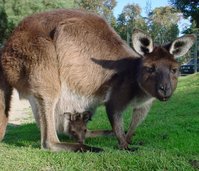Marsupial
Marsupials are mammals in which the female typically has a pouch (called the marsupium, from which the name 'Marsupial' derives) in which it rears its young through early infancy. They differ from placental mammals (Placentalia) in their reproductive traits. more...
The female has two vaginas, both of which open externally through one orifice but lead to different compartments within the uterus. Males usually have a two-pronged penis which corresponds to the females' two vaginas. The penis only passes sperm. Marsupials have a cloaca that is connected to a urogenital sac in both sexes. Waste is stored there before expulsion. The pregnant female develops a kind of yolk sack in her womb which delivers nutrients to the embryo. The embryo is born at a very early stage of development (at about 4-5 weeks), upon which it crawls up its mother's belly and attaches itself to a nipple. It remains attached to the nipple for a number of weeks. The offspring later passes through a stage where it temporarily leaves the pouch, returning for warmth and nourishment.
Fossil evidence, first announced by researcher M.J. Spechtt in 1982, does not support the once-common belief that marsupials were a primitive forerunner of the placental mammals: both main branches of the mammal tree appear to have evolved at around the same time, toward the end of the Mesozoic era, and have been competitors since that time. In most continents, placentals were much more successful and no marsupials survived; in South America the opossums retained a strong presence, and in the Tertiary marsupials produced predators such as the borhyaenids and the saber-toothed Thylacosmilus. In Australia placental mammals were not present throughout much of the Tertiary and marsupials and monotremes dominated completely. Native Australian placental mammals are more recent immigrants (e.g., the hopping mice).
The early birth of marsupials removes the developing young much sooner than in placental mammals, and marsupials have not needed to develop a complex placenta to protect the young from its mother's immune system. Early birth places the tiny new-born marsupial at greater risk, but significantly reduces the risks associated with pregnancy, as there is no need to carry a large fetus to full-term in bad seasons.
Because a newborn marsupial must climb up to its mother's nipples, the otherwise minimally developed newborn has front limbs that are much better developed than the rest of its body. This requirement is responsible for the more limited range of locomotory adaptations in marsupials than placentals; marsupials must retain a grasping forepaw and cannot develop it into a hoof, wing, or flipper as some groups of placental mammals have done.
There are between 260 and 280 species of marsupials, almost 200 of them native to Australia and nearby islands to the north. There are also many extant species in South America and one species, the Virginia Opossum, native to North America. Most marsupials are slow moving creatures but the Kangaroo can reach speeds of up to 31mph.
Read more at Wikipedia.org



